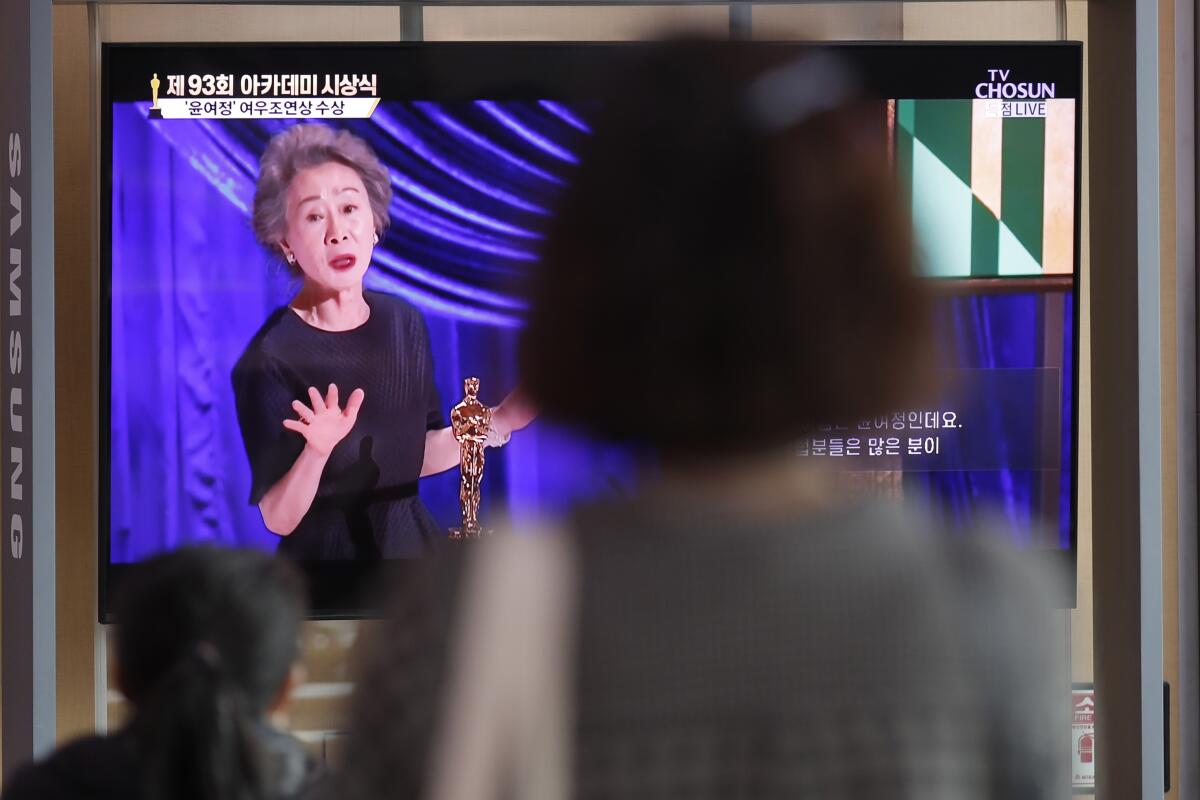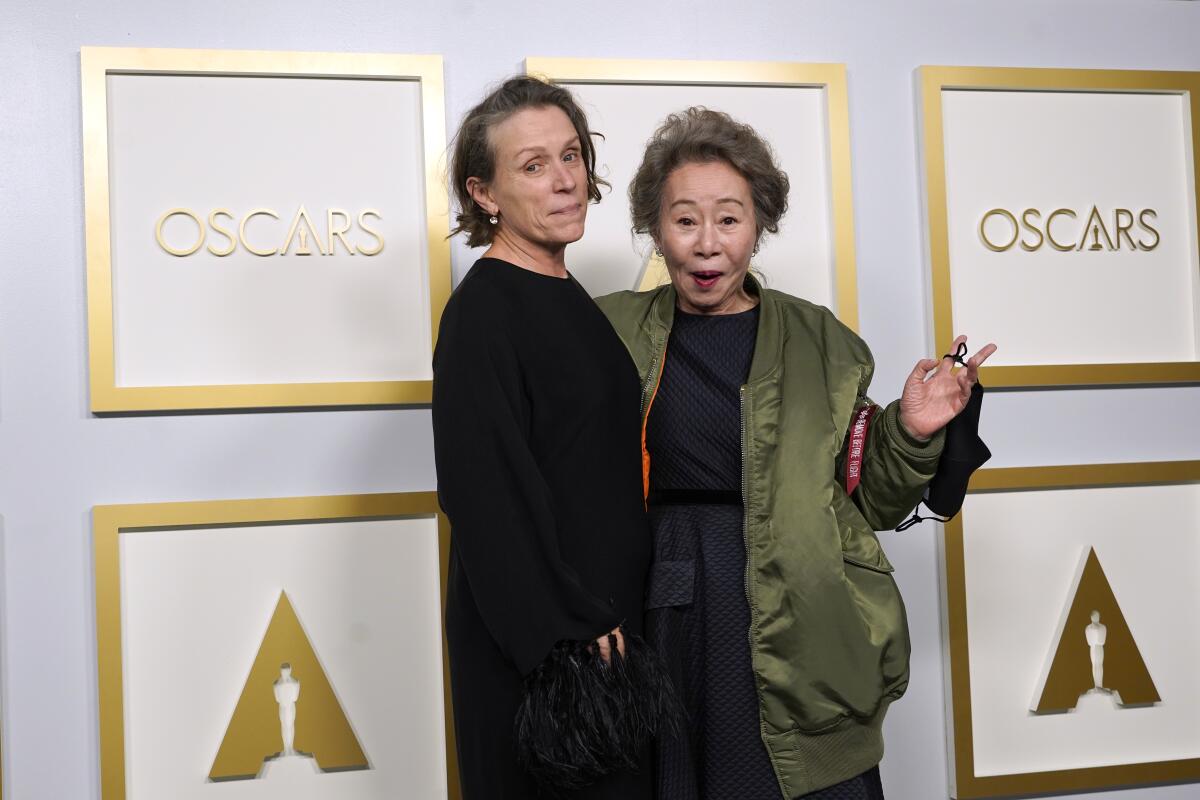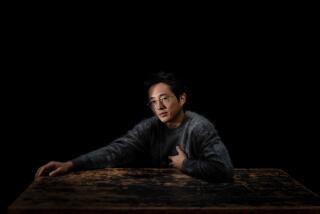South Korea cheers ‘trailblazing’ Yuh-Jung Youn, a pusher of boundaries

SEOUL — Wonsuk Chin distinctly remembers sitting in a theater in South Korea as a cinema-loving teenager, blown away by Yuh-Jung Youn’s performance in the 1985 revenge film “Mother.”
More than 35 years later, as Youn was named best supporting actress at this year’s Academy Awards for her role in the immigrant family tale “Minari,” marking the first-ever Oscar win by a South Korean actor, Chin sat with tears in his eyes watching the broadcast live at his home in Seoul.
“She’s a trailblazer in so many ways,” said Chin, a filmmaker who has worked in both South Korea and the U.S. “This actor who’s been making Korean movies and dramas for 50 years can become beloved by the world.”
In her acceptance speech Sunday night, Youn said that the various Europeans and Americans who had been mispronouncing or misremembering her name during the award season were forgiven. In her native South Korea, no one has that problem: She’s been a household name and a familiar presence on screens big and small for more than half a century.
Here, the award simply marked the rest of the world catching up to the talent and wit that local audiences have loved Youn for across the decades.
Her win was celebrated especially as a triumph for women who don’t readily fit into a social mold, given the wide-ranging and often risky roles Youn has essayed since she began acting in 1966. South Korean mothers and grandmothers who’d previously paid little attention to the Oscars tuned in to watch the ceremony live despite its mid-morning Monday broadcast time here.
“The Academy Awards aren’t everything,” Youn said at a news conference with South Korean media at the consul general’s residence in Los Angeles following the ceremony. “The academy’s wall was so high, it was higher than Trump’s wall. It was too high a wall for Asians.”
For South Korea’s robust film industry, the acting nod for Youn was another feather in the cap after director Bong Joon Ho’s win for best director and best picture last year for “Parasite.”
South Korean President Moon Jae-in added his congratulations, praising Youn for her “endless passion.”
“The movie ‘Minari’ is very significant. It told one family’s immigration story as a universal tale of life, and confirmed that wherever we may live, all of us are intimately connected,” Moon said in a statement. “Youn Yuh-jung’s acting shined, bringing to life the images of our grandmothers, our mothers.”
Like her character, Soonja, in Lee Isaac Chung’s semi-autobiographical drama, whose grandson complains she’s not the typical cookie-baking grandma, Youn has pushed the boundaries of women’s roles both on screen and off in South Korea over the decades. Fictionally, she’s played everything from a seductress maid to an aging prostitute to a devoted grandmother with Alzheimer’s. In her personal life, she’s been a working single mother since her divorce in the 1980s, unapologetic about her life and her choices.

“Because it’s my first go at life, I can’t help but regret, can’t help but hurt, can’t plan everything,” she said on a television program, in a quote that went viral after her Oscar win. “You just live. The only thing you can do is to let things go, give up. Don’t hold on as you grow older.”
Park Ga-eun, a college sophomore, skipped her Monday morning class to watch the awards ceremony on a big screen at a movie theater in Seoul.
“We were all screaming and applauding,” Park, a music major and an aspiring film composer, said of the moment Youn’s award was announced. “It’s so meaningful, so admirable. It’s amazing she’s still challenging herself at her age.”
Park said Youn’s win made her dream of working in the movie industry, perhaps even in Hollywood, feel a step closer and just a tad more attainable.
“For young women, she’s giving us the drive not to give up and keep trying,” she said.
Train zombies. Historic zombies. High-rise apartment zombies. DMZ zombies. The undead are proliferating in South Korea’s imagination.
Youn said she had no expectations that she’d win — “I’ve lived a long time and have been let down many times” — but nonetheless felt the mounting pressure from all the hopes that fellow South Koreans seemed to hang on her possible win. She sympathized with the country’s World Cup soccer team, she said at the news conference with South Korean media.
In the end, Youn said she believed it was the heart of the film that connected with audiences and that allowed her to go home Sunday clutching a golden statuette.
“We made this film with our sincerity, and that sincerity got through,” she said.
More to Read
Sign up for Essential California
The most important California stories and recommendations in your inbox every morning.
You may occasionally receive promotional content from the Los Angeles Times.











